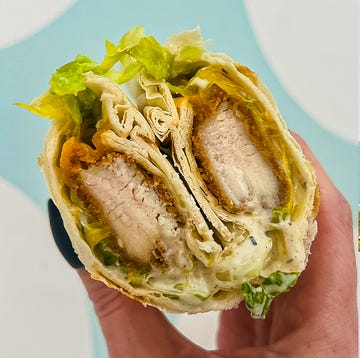1Flavored Smoothies and Yogurts
Fruit smoothies and yogurt "tubes" are often just extra sugary versions of a previously good-for-you food. Look for Greek yogurts and blended bevs under 12 grams of sugar a pop to ensure that your dairy-based snack contains more protein than sweet stuff. It'll help you stay satisfied and keep cravings at bay.
2Treats in Bulk
Two-for-one candy deal? Skip it! While it's a cost saver, buying oversized bags of candy or cookies can make it hard to resist going back for more. Save up on sugar and indulge in something you really love — not stale Easter candy just because it's on sale!
Advertisement - Continue Reading Below
3Processed Snack Packs
Eliminate lunchbox meals with processed meat and cheese from your grocery list ASAP. They're filled with sodium and saturated fat, and provide little to no fiber. In fact, many versions of these processed snack products can set you back 600 milligrams of sodium — that's about 30% of your recommended daily amount!
4Pre-Made Cocktail Mixers
Margarita and bloody mary mixes are top offenders, but even healthy-sounding options can be total sugar bombs, setting you back up to 60 grams per 12-ounce cocktail. Try adding fresh or frozen berries for an extra hit of flavor (and fiber!) instead. Unsweetened flavored seltzers can also help you hydrate while you indulge.
Advertisement - Continue Reading Below
5Foods With Partially-Hydrogenated Oils
Partially-hydrogenated oils, or trans fats, are a man-made type of saturated fat linked to raising "bad" cholesterol. The FDA mandated them out of the food supply by 2018, but you should still avoid them now. The most common culprits include: condiments, icing, coffee creamer, butter substitutes and even some snack foods, like trail mix.
6Juice
The concentrated sugar in juice — even "100% fruit juice" or "fresh squeezed" kinds — is higher in calories and lower in nutritional value than whole fruit. You're much better off eating produce, which is full of fiber, antioxidants, vitamins and minerals. Skipping sugary beverages in general can also help you lose or maintain weight in the long run.
Advertisement - Continue Reading Below
7Bottled Salad Dressing and Dips
Salad dressings can be packed with sodium, sugar and saturated fat, but the real issue is serving size. Most dressings use 1 tablespoon, smaller than the usual drizzle. Top greens with avocado, poached eggs or marinated veggies and skip dressing altogether. They'll contribute heart-healthy fats without the additives and bloat-inducing salt.
8Bottled Tea and Coffee Beverages
Bottled brews can be just as sugary as soda. Read labels carefully and look for ones that specify zero grams on the label to ensure that you're getting sugar substitutes or no sweeteners at all. Your best bet: making a big batch of iced tea or coffee at home.
Advertisement - Continue Reading Below
9Gluten-Free Snacks
If you're among the 1% of Americans suffering from celiac disease (or a diagnosed gluten intolerance), gluten-free alternatives can be amazing substitutes for favorite foods! But if you're buying them for the alleged health benefits, you're out of luck. Gluten-free goods are often loaded with sugar, salt and saturated fat to improve flavor. Choose something with 100% whole grain as the first ingredient instead.
10Vegan Ice Cream
Simply because a product omits cow milk doesn't mean it's better for you. In fact, vegan ice creams made with coconut milk can be even higher in saturated fat and sugar. If you're lactose-intolerant, choose ones made with soy, coconut, almond or cashew milk with the smallest amount of sugar and saturated fat possible. But if you eat vegan for the proposed health benefit, the truth is you're better off with the real deal.
Advertisement - Continue Reading Below
11Low-Fat Foods (That Shouldn't Be)
The "reduced fat" versions of peanut butter, Greek yogurt and nuts sound healthy, but food manufacturers often add sugar to replicate taste. Opt for the full-fat offerings instead, except when it comes to part-skim cheese, milk and other condiments that don't swap fat for sugar. They can help meet protein needs without going overboard on added calories.
Advertisement - Continue Reading Below
Advertisement - Continue Reading Below
Advertisement - Continue Reading Below
























